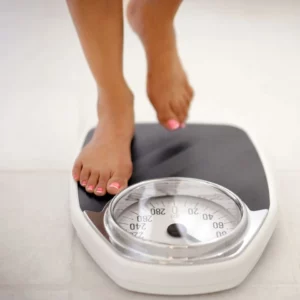Maintaining a healthy weight is an important aspect of overall well-being, and for many people, tracking their weight is a part of their health and fitness journey. However there is a lot of misunderstanding around weight tracking. Our weight can vary considerably over a day because of our hydration level, the type of food ingested the day before, physical exercise, outside temperature, the amount of salt intake, stress levels, the menstrual cycle.

Measuring your weight accurately is essential to make informed decisions about your health, this is why I’d like to share some tips on the best way to do it.
- Consistency is key: To get accurate results, always weigh yourself at the same time of day and under the same conditions. Mornings, before eating or drinking, and after using the bathroom are typically the best times. This consistency helps to reduce fluctuations due to factors like food, hydration, and clothing.
- Choose the right scale: Invest in a good quality scale that provides consistent and accurate readings. Digital scales are usually more reliable than analog ones. Make sure the scale is on a hard, level surface and calibrated correctly.
- Minimal clothing: To ensure accuracy, wear the same type of clothing or minimal clothing each time you weigh yourself. Heavy clothing, shoes, and accessories can add extra pounds and lead to inaccurate readings.
- Empty your bladder: A full bladder can add several pounds to your weight. To get a true reflection of your body weight, visit the restroom before weighing in.
- Use a consistent method: Whether you prefer to use pounds or kilograms, stick with one unit of measurement for consistent tracking. Converting between units can lead to confusion and potential errors.
- Stay mindful of variability: It’s essential to understand that your weight can naturally fluctuate throughout the day and week due to factors like hydration, food intake, and exercise etc. Don’t be discouraged by minor daily fluctuations; instead, focus on long-term trends.
- Set a weighing schedule: Weighing yourself daily isn’t necessary. It can lead to unnecessary stress and obsession. For most people, weighing in once a week is sufficient to track progress and make adjustments to your diet and exercise routines.
- Consider other metrics: While your weight is an important metric, it’s not the only one. Factors like body composition, waist circumference, and overall health are also crucial. Sometimes, progress is better measured by how your clothes fit, how you feel, or other health markers.
- Don’t forget the bigger picture: Remember that your weight is just one aspect of your health. It’s important to focus on overall well-being, including your diet, physical activity, sleep, and stress management.
By following these guidelines, you can ensure that the numbers you see on the scale are a reliable reflection of your progress. However, always consult with a healthcare professional or registered dietitian for a comprehensive assessment of your health and weight management plan, as we can provide personalised guidance and support.